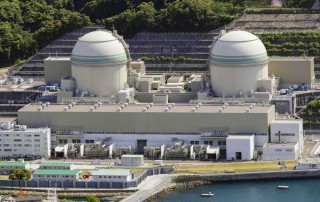Loading
Search
▼ Kansai Electric Yet To Regain Trust Two Years After Gifts Scandal
- Category:Other
Kansai Electric Power Co. has promoted corporate governance reform since the revelation two years ago that company executives had received cash and gifts from an influential politician in a municipality that hosts a nuclear plant of the utility.
The company still has a long way to go before regaining public trust, however, questions over its seriousness about reform have been rekindled in part by allegations of a cartel with other major electric power companies.
In the gift scandal, it has been revealed that 83 people including executives of Kansai Electric had received cash and gifts worth a total of ¥370 million from a late former deputy mayor of Takahama, Fukui Prefecture, in return for placing construction work orders with a company close to him. The western Japan town hosts the company’s Takahama nuclear power station.
The company, which serves the Kansai region, has revamped its management team, with the resignation of then Chairman Makoto Yagi and then President Shigeki Iwane, while strengthening the oversight authority of outside directors.
In an attempt to reform corporate culture, it has introduced a training course of 100 hours annually to improve board members’ awareness of the importance of legal compliance. Training for all employees has also been conducted.
To prevent irregularities, Kansai Electric has encouraged employees to make better use of its whistle-blowing system. The effort has revealed questionable gift receipts at a subsidiary and the falsification of subsidiary employees’ eligibility to take a national qualification exam.
Company officials welcome such results as proof that the new governance system worked. President Takashi Morimoto said it is important to detect mistakes and not conceal them in order to prevent a recurrence.
But the company is still halfway through its governance reform.
Since April this year, the Fair Trade Commission has carried out an on-site inspection of Kansai Electric twice on suspicion that the company had formed a cartel with industry competitors, including Chubu Electric Power Co., Chugoku Electric Power Co. and Kyushu Electric Power Co., in which they agreed to refrain from acquiring customers outside their respective service areas.
Yoshinao Matsumoto, professor of Kansai University School of Accountancy, who is well-versed in legal compliance by companies, said the anticompetitive practice demonstrated that the company’s governance system is only superficial and does not work effectively. Kansai Electric “has not shed the character of a monopoly company,” he said.
In June, Kansai Electric announced the abolition of the post of consultant to strengthen its corporate governance. But the company maintained the post of adviser although it started disclosing individual pay for advisers.
Matsumoto said it cannot be said that the company’s governance has improved fully, noting that the responsibilities of advisers are obscure.
The company still has a long way to go before regaining public trust, however, questions over its seriousness about reform have been rekindled in part by allegations of a cartel with other major electric power companies.
In the gift scandal, it has been revealed that 83 people including executives of Kansai Electric had received cash and gifts worth a total of ¥370 million from a late former deputy mayor of Takahama, Fukui Prefecture, in return for placing construction work orders with a company close to him. The western Japan town hosts the company’s Takahama nuclear power station.
The company, which serves the Kansai region, has revamped its management team, with the resignation of then Chairman Makoto Yagi and then President Shigeki Iwane, while strengthening the oversight authority of outside directors.
In an attempt to reform corporate culture, it has introduced a training course of 100 hours annually to improve board members’ awareness of the importance of legal compliance. Training for all employees has also been conducted.
To prevent irregularities, Kansai Electric has encouraged employees to make better use of its whistle-blowing system. The effort has revealed questionable gift receipts at a subsidiary and the falsification of subsidiary employees’ eligibility to take a national qualification exam.
Company officials welcome such results as proof that the new governance system worked. President Takashi Morimoto said it is important to detect mistakes and not conceal them in order to prevent a recurrence.
But the company is still halfway through its governance reform.
Since April this year, the Fair Trade Commission has carried out an on-site inspection of Kansai Electric twice on suspicion that the company had formed a cartel with industry competitors, including Chubu Electric Power Co., Chugoku Electric Power Co. and Kyushu Electric Power Co., in which they agreed to refrain from acquiring customers outside their respective service areas.
Yoshinao Matsumoto, professor of Kansai University School of Accountancy, who is well-versed in legal compliance by companies, said the anticompetitive practice demonstrated that the company’s governance system is only superficial and does not work effectively. Kansai Electric “has not shed the character of a monopoly company,” he said.
In June, Kansai Electric announced the abolition of the post of consultant to strengthen its corporate governance. But the company maintained the post of adviser although it started disclosing individual pay for advisers.
Matsumoto said it cannot be said that the company’s governance has improved fully, noting that the responsibilities of advisers are obscure.
- September 27, 2021
- Comment (0)
- Trackback(0)


